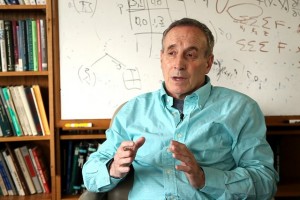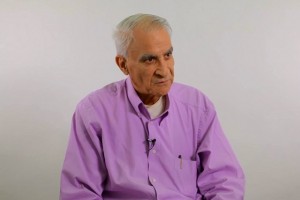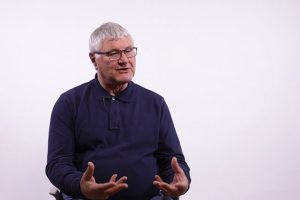General Relativity Fiscal Language
Economist Laurence Kotlikoff on the difference between taxing and borrowing, government debts, and financial ...
What is the difference between apples that grow on trees and Apple products sold in the store? Why does imagination make some nations more prosperious than others? What is personbyte and does it define economic complexity? The comments were provided by MIT Prof. Cesar Hidalgo.
Understanding what economy is and what economy does is not very simple. But actually there are some ways that we can use to try to understand what economy is and what economy is doing, that, I find, are more insightful than what would be the most traditional approaches. One question that I always love to ask when I’m talking about economic complexity to people, is to ask them: “What is the true difference between an apple that you buy in a supermarket, the apple that grows on a tree, and the Apple you buy in the Mac store and you use to check your email?”. These are both products, these are both highly complex, they are both negative entropy, if you put it from a scientific point of view, they are highly organized pieces of matter, but what is the true difference between the two?
You know they are both highly ordered. But actually the true difference between the two is the source of the order. So let me tell you why. The apple that you buy in a supermarket, the apple that grows on a tree is a product that existed first in the world and then in your head. There were apples before you had markets for apples, before you had a name for an apple, before you had a price for an apple. They were first in the world and then in your head. The Apple iPhone or the Apple that you use to check your email is an Apple that existed first in someone’s head and then in the world. So you think, those two products are highly ordered, but one of the products crystallizes the order from nature, from self-organization, from evolution. And the other one crystallizes order that emerged first as imagination. So although both are crystals of order, one is a crystal of imagination.
So why do we crystallize the imagination? One of the reasons of why we crystallize imagination is that by doing so we are able to share our knowledge and our ideas with others in ways that would not be possible without making tangible associations with them. Imagine now that you buy a tube of toothpaste. Let’s say that you buy a tube of toothpaste. What are you buying? Are you buying some paste in a tube? Not necessarily.
Actually what you’re buying is you are buying access to knowledge of how to synthesize sodium fluoride. You are buying access to the imagination of how do you develop this source of chemical synthesis. Because I do not know how to synthesize sodium fluoride, but I make use of the synthesis of sodium fluoride every day when I brush my teeth. I do not know how to build ceramics, but I enjoy them every morning when I sit on the can. I do not know how to manufacture most of the things that I use and I do not know the knowledge that is required, I don’t even have a clue of how those intricate mechanisms that are making those machines work work. I don’t know how to make electrons dance, following the structures of my voice through the mobile phone, but eventually I can use it. So eventually, when we crystallize imagination, we are putting that in a package and a product is nothing else than a vehicle by which we make our knowledge and our imagination accessible to others.
Also the fact that we crystallize imagination is something that is extremely human and that is from my point of view the main difference between us and other species. There is a lot of talk out there that they try to make you believe that the prosperity of a nation comes from competition, or comes from the fact that we’re self-interested or selfish, but if you think about it, hippopotamus, crocodiles or barracudas – they are all quite selfish. In some sense the problem of the crocodile’s society is not that they are not selfish enough, is not that they are not self-centered enough, is not that there is enough competition. They have all of those components. The main difference is that they are not able to transform imagination into reality.
If you think about it, even apes are able to use some sort of tools, the tools that they use are quite primitive. They can take a stone and they can make something out of that stone. Or a dolphin can take a sponge and can use this sponge to dig holes on the bottom of the ocean and get fish and different things that way. But all of those are just modifications of one piece. When you have something that is as simple as an arrow, then you have a combination of things. Thus, all you have a little twig, and you have a tip that is made of stone and you have a way of connecting that tip of stone to the twig. And you have some feathers to make sure that it flies in a straight path.
Those things that are concoctions of different things, that are combinations of different pieces of matter is the things that we can actually create and that make us uniquely human, because they are not simple modifications of things that are out there in nature, but are things that at some point existed only in someone’s head as a set of synapses. Eventually they were put out into a product that allows that knowledge to be shared with others.
So now the question is, as a society we have been able to become rich, because we crystallize imagination. We have created this diversity of things that we are able to enjoy and are able to operate at this high level of knowledge, because we crystallize imagination and we share our knowledge with others through these packages of knowledge. Why are some countries so much better in crystallizing imagination than others? Why some countries can basically crystallize anything that they can imagine and they can put a man on the Moon, when other countries have still not been able to figure out how to get fresh fish out of a port?
The thing is, in order to crystallize imagination you don’t need just imagination, you also need productive knowledge. These are two things that are complimentary. Let me give an example. Let’s say that you imagine a guitar. Imagine making a guitar. But in order to make a guitar you need to know how to cut wood, how to shape that wood, how to paint that wood, how to find the wood that vibrates beautifully, how to make it strong enough that it can support the strings. You have to figure out where you have to put those threats, so that you would have actually a scale that you can use to articulate chords and notes and make melodies. You need to know how tense you’re going to be able to put each one of those strings. So actually you need a lot of knowledge to be able to transform that imagination into reality.
In some sense although imagination might be everywhere, everybody can imagine a flying machine, very few people can build a flying machine. Because in order to do that you need knowledge. And what happens in many cases is the amount of knowledge that you need is larger than the one that you can have in a single person.
Here, what we have done is we’ve introduced a concept of a personbyte as the maximum amount of knowledge that a person can hold. A person is finite, by all means, in capacities and the capacity that it has to accumulate productive knowledge we are going to say that it is one personbyte. So in order to put a man on the Moon you don’t need one personbyte, you probably need hundreds of thousands of personbytes. Because it is something you cannot do alone, you cannot do it in a team of two, or three, or four. It requires a large collaboration of people that percolate the barriers of space, time and anonymity. You have to have these large networks of people to hold enough productive knowledge to be able to produce that product.
And that’s where the economic complexity becomes fun, because you see that we have evolved from very humble and simple origins to crystallize imagination. To go from the fact that we would take an object like a rock and we would shape it a little bit to be able to create concoctions of objects like arrows. And then, eventually, concoctions of objects that are so complex that you have to get a large number of people to participate in it. As we do so, these networks of people that are required to participate in economy become larger and larger, and larger, and larger. So there is a positive side of it. The positive side of it is that we can build cars, we can go to the Moon, we can fly around the world in a matter of hours, in half a day we can go basically almost anywhere in the world.
So those are the positive aspects of it. But there are also some negative aspects of it. The way that we think about markets is very different when we realize that as economies evolve, they are creating larger and larger concoctions of people and the networks of people that are required to hold that productive knowledge. So if you think about the way that people think about markets, there is a sort of a myth going around, which is this Adam Smith’s Disney interpretation of a market, in which you have a horse-shoemaker and you have a brewer, and you have a baker and they all buy things in the village, sell things in the village from each other and they become more prosperous as they do those things. But if you realize in that fairy tale economy the one that produces and the one that consumes are basically all the same, there is very little separation between the agents that participate in these economic activities.
Our world is not like that. Now there is more and more of what is made of large, large organizations. If you think about those organizations – the World Bank has tens of thousands of people. Or a company like Walmart has millions of people, or Foxconn has millions of people, or Apple has tens of thousands of people. And the market is reduced to the interactions that happen between these large networks of people.
So there are interactions that happen between Intel and Apple. Or between Apple and Adobe. Or between Adobe and Microsoft. Or between Microsoft and Fujitsu. So there are these interactions between those large networks. And those interactions are interactions in which the mechanisms of the market might be operating, but in reality most of the distribution that happens inside economies is not happening through market mechanisms. Those are happening internally within those organizations. If the World Bank is going to focus more on gender than is going to focus on building roads, it’s not because there is some market mechanism that determined that, it’s because that people that focus on gender internally within the Bank were better at convincing their higher-ups that gender was important issue and not transportation.
As you think about it, as we continue evolving, we continue developing our capacity to crystallize imagination, we keep on creating these large networks. But as we keep on creating these large networks, the market that enabled the creation of these large networks begins to disappear. Because most of the links and the distribution become internal, and the market evolves to a set of political systems, which are companies and corporations. In which the allocation decisions that are internal to them are actually decided based on political battles that are internal and that are not based on the market that is thought to have them to allocate in the first place.
You can think that economic complexity emerges as an extension of making things that are increasingly more complex, of accomplishing things. I think that there is an aspect of human nature in which we want to accomplish things. And that’s different from an aspect of having a self-interest, but it is more in fact creative type of endeavor. It is not a consumption goal, but a production goal, that we all have. From that point of view we look to create alliances with other people so we are able to achieve those goals. In order to enable that to happen economic complexity needs to evolve with different types of institutions that allow those type of things to happen.
So I can tell you a story that can illustrate the interaction between institutions and economic complexity. Thomas Jefferson, he was one of the Founding Fathers of the United States, had this plantation on a hill in Monticello and originally he was dedicated to tobacco. Thomas Jefferson was a slave owner at that time and his slaves lived in very poor conditions on the tobacco plantation. But eventually the price of tobacco plummeted and he was not able to support the farm anymore based on the plantation of tobacco, so he had to change the crop. He changed to wheat and another crops and he realized that the division of labor that was required to plant wheat was larger than the one that was needed to plant tobacco. Tobacco was a much simpler crop.
So eventually what happened is that as he changed crops he had to change the whole set of institutions that were in the farm. The slaves during that era in which he was planting tobacco were all at the same level and they all lived in very bad conditions but then as he switched from tobacco to wheat he had to start actually dividing his workers into different classes and giving them different types of amenities. So for example, they would have a house for them and their family, which was something that did not happen during the tobacco times.
This shows that eventually as societies develop and as the complexity of products develop basically institutions co-evolve with them. If you think about it, during the Industrial Revolution and during the beginning of the 20th century women were not included in the labor force not because men all of a sudden became better hearted and more inclusive. It was because actually they could be included in factory work and they were needed at a time of war. The complexity of the task was such that it could be divided into smaller sub-units in which women and children were able to participate. And that was the point that was made by Alexander Hamilton when he started arguing in the favor of manufacturers during the War of Independence in the United States.
Eventually what you see is that for complexity to evolve these complexities are always co-evolving with society. And what we make ultimately starts shaping what our society is.

Economist Laurence Kotlikoff on the difference between taxing and borrowing, government debts, and financial ...

Economist Assaf Razin on financial deregulation, risk-shifting behaviour and the Philips curve

Professor Colin Sparks on Shakespeare, video games, and a broader definition of culture